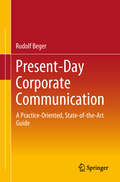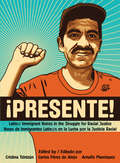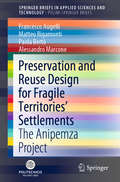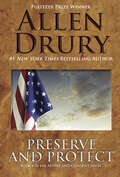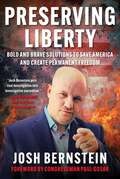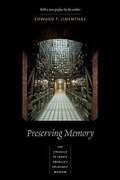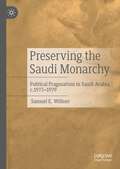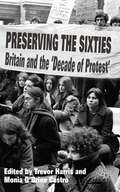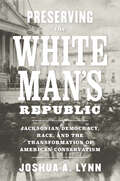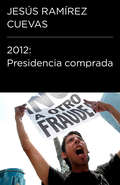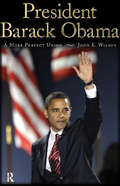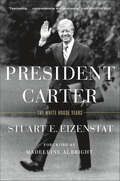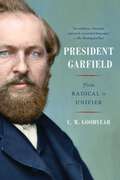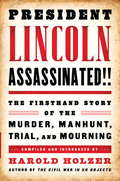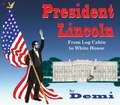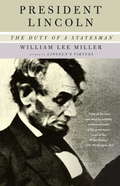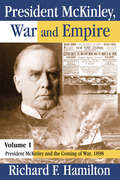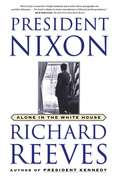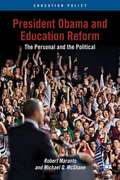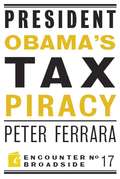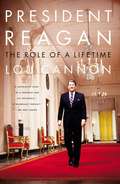- Table View
- List View
Present-Day Corporate Communication: A Practice-Oriented, State-of-the-Art Guide
by Rudolf BegerThis book serves as an easy-to-read, up-to-date practical guide on professional corporate communication. The key market for this book is the Asia-Pacific region, mainly because there is a gap in know-how in corporate communication among many industry sectors. In addition, at present, one cannot find a lot of educational literature about corporate communication in the market. Therefore, this guidebook closes that gap. In Asia, companies are starting to realize the importance of corporate communication in all areas (external and internal corporate communication, crisis communication (Example: TEPCO) and political communication / government relations / lobbying). This is triggered not only by the recent high profile and success of targeted (political) communication in the USA, but also by the notorious export-orientation of many Asian companies and their increasingly multi-national orientation (fostered by M&A and foreign investments). In addition, the increasing importance of online communication and digital/social media is an important reason why existing guidebooks on corporate communication have to be reassessed and modernized. This book focuses on all major aspects of modern corporate communication, including online / digital communication, and covers new developments, such as “fake news”, “post-truths”, “political correctness”, “the art of bridging” and other new phenomena in the world of (corporate) communication. Simple cartoon-style drawings supplement the text in order to facilitate reading and learning. Corporate communication professional, as well as students and professors in business/management programs, will be given tools to effectively and successfully plan and implement corporate communication strategies and tactics in all major areas.
Presente!: Latin@ Immigrant Voices in the Struggle for Racial Justice / Voces Inmigranted Latinas en la Lucha por la Justicia Racial
by Juan González Arnulfo Manríquez Cristina Tzintzún Carlos Pérez de AlejoRead the media coverage of the increasingly heated debate around immigration reform in the United States: two dominant narratives emerge. From Lou Dobbs to Sean Hannity, commentators on the right have crafted an image rooted in fear, demonizing undocumented immigrants as a threat to national security and raising the specter of a deliberate "browning of America." Left-leaning journalists, on the other hand, foreground victimization, emphasizing the plight of immigrants, stripping them of their agency. Neither captures the range of experiences within undocumented immigrant communities, and both fail to see immigrants as active participants in their own struggle for racial and economic justice.Presente! offers a rare perspective on the immigrant-rights movement, written by immigrant workers themselves. Including a range of essays exploring the intersection of race, class, and immigration in the United States, this anthology challenges its readers to move beyond a "legalization-only" framework and embrace a broader vision for social justice organizing embodied in the work of grassroots organizations across the country resisting state repression, cultivating solidarity, and building alternative models for progressive social change. Offered in a dual-language edition, with a foreword by Democracy Now! co-host Juan Gonzáles.Cristina Tzintzún is the executive director of Workers Defense Project, a Texas based workers' rights organization.Carlos Pérez de Alejo is the executive director of Cooperation Texas, an organization dedicated to the creation of sustainable jobs through the development, support, and promotion of worker-owned cooperatives.Arnulfo Manríquez is an organizer at Workers Defense Project, where he organizes immigrant construction workers to defend their labor and human rights.
Preservation and National Belonging in Eastern Germany
by Jason JamesDrawing on cultural anthropology and cultural studies, this book sheds new light on the everyday politics of heritage and memory by illuminating local, everyday engagements with Germanness through heritage fetishism, claims to hometown belonging, and the performative appropriation of cultural property.
Preservation and Reuse Design for Fragile Territories’ Settlements: The Anipemza Project (SpringerBriefs in Applied Sciences and Technology)
by Francesco Augelli Matteo Rigamonti Paola Bertò Alessandro MarconeThis book reports on an architectural conservation and reuse project in Anipemza, an Armenian Soviet-era village on the Turkish border, just a few steps away from the important Yererouyk archaeological site. Based on current tourist trends, the book suggests the development of a social system and micro-economic reactivation model to endorse the territory’s numerous cultural resources and preserve the memory of the village that housed the genocide orphanages and the many other stories associated with the village. Further, the development of sustainable tourism will lead to an improved relationship between locals and visitors. Examining the development of a system of strategies able to cope with the existing social, economic and hygiene problems as well as the architectural preservation aims, the book provides valuable guidelines for the local community.
Preserve and Protect (Advise and Consent #4)
by Allen DruryDrury describes the chaos that overtakes America and the world with the suspicious death of the President just after his renomination. His death leaves the incumbent party without a candidate or a clear-cut way of selecting one. Against a backdrop of national and international chaos, Drury examines the motives and ambitions of a now-famous gallery of political characters. As the novel moves to its dramatic climax, the question of what candidate will be nominated by what groups keeps the future of America and the world hanging in the balance.
Preserve and Protect (Advise and Consent)
by Allen DruryPart of the saga begun with the Pulitzer Prize–winning, #1 New York Times bestseller, &“one of the finest and most gripping political novels of our era&”(The New York Times). The United States is thrown into chaos as the President is killed in a plane crash shortly after securing his party&’s nomination in a hotly contested race for re-election. As suspicions are cast upon the circumstances of the plane crash, the incumbent party quickly convenes to nominate a candidate in a storm of domestic and international chaos. Against the backdrop of a rich cast of characters, the motivations and drives of each candidate and player help shape the future of the nation and the world. Praise for Advise and Consent: "Fifty years after its publication and astounding success . . . Allen Drury&’s novel remains the definitive Washington tale. —The Wall Street Journal
Preserving Liberty: Bold and Brave Solutions to Save America and Create Permanent Freedom
by Josh BernsteinIn order to show the potentialities of a brighter future, we must first resuscitate the visions of a better past. In Josh Bernstein's long awaited debut book, Preserving Liberty, he transforms himself from a daily news commentator into a political surgeon ready to dissect piece by piece every policy, politician, and propaganda in this written autopsy of what is killing our great nation. Josh tackles all the tough issues with wit, humor, and cold hard facts. In Preserving Liberty, you will learn: How to restore voter integrity and confidence How to balance the electorate to give every American a voice How to end the class warfare argument How to rein in Washington permanently How to finally solve our immigration issues How to control spending How to restore accuracy in media, and much more What sets Josh apart from many others is he doesn't just point out our problems and complain about them; he offers sound achievable solutions. How do we solve our nation&’s problems and permanently preserve liberty for current and future generations? Find out in Preserving Liberty.
Preserving Memory: The Struggle to Create America's Holocaust Museum
by Edward T. LinenthalSince its first year in 1993, the United States Holocaust Memorial Museum has attracted more than 15 millino visitors, sometimes at the rate of 10,000 a day, each of whom has walked away with an indelible impression of awe in the face of the unimaginable. This lively, honest, behind-the-scenes account details the emotionally complex fifteen-year struggle surrounding the museum's birth.
Preserving Neighborhoods: How Urban Policy and Community Strategy Shape Baltimore and Brooklyn
by Aaron PassellHistoric preservation is typically regarded as an elitist practice. In this view, designating a neighborhood as historic is a project by and for affluent residents concerned with aesthetics, not affordability. It leads to gentrification and rising property values for wealthy homeowners, while displacement afflicts longer-term, lower-income residents of the neighborhood, often people of color.Through rich case studies of Baltimore and Brooklyn, Aaron Passell complicates this story, exploring how community activists and local governments use historic preservation to accelerate or slow down neighborhood change. He argues that this form of regulation is one of the few remaining urban policy interventions that enable communities to exercise some control over the changing built environments of their neighborhoods. In Baltimore, it is part of a primarily top-down strategy for channeling investment into historic neighborhoods, many of them plagued by vacancy and abandonment. In central Brooklyn, neighborhood groups have discovered the utility of landmark district designation as they seek to mitigate rapid change with whatever legal tools they can. The contrast between Baltimore and Brooklyn reveals that the relationship between historic preservation and neighborhood change varies not only from city to city, but even from neighborhood to neighborhood. In speaking with local activists, Passell finds that historic district designation and enforcement efforts can be a part of neighborhood community building and bottom-up revitalization.Featuring compelling narrative interviews alongside quantitative data, Preserving Neighborhoods is a nuanced mixed-methods study of an important local-level urban policy and its surprisingly varied consequences.
Preserving the Saudi Monarchy: Political Pragmatism in Saudi Arabia, c.1973-1979
by Samuel E. WillnerThis book provides a new perspective on the study of the Kingdom of Saudi Arabia and its monarchy – its political leadership and decisions. Moreover, it analyzes how that decision-making evolved before, during, and after the Arab–Israeli War of 1973, and the subsequent Arab oil embargo that followed; the run-up to and aftermath of the 1975 murder of King Faysal; discussions over the oil weapon; and Saudi responses to the Carter presidency in the United States. Through the prism of tribal decision-making, this book sheds new light on a number of important political events, which have shaped the political leadership in Saudi Arabia, and explores the behind-the-scenes workings of the Saudi royal family.
Preserving the Sixties
by Trevor Harris Monia O�brien CastroIt is often claimed that the Sixties in Britain were dominated mainly by 'youth' and 'protest'. True, the desire to escape outmoded social, moral and artistic conventions was illustrated in a rich, provocative cultural production, as well as through a number of radical social and political movements or reforms. However, as this collection argues, innovation was everywhere shadowed by conservatism. A decade fascinated by itself and, especially, by the future, was tormented by self-doubt and accompanied by a fear of losing the past. Ultimately the 'radicalism' of the Sixties in Britain is also visible in its conservatism, in the spectacular, novel ways in which the decade expressed and absorbed the new, yet preserved the old. Rather than pitting radical against conservative, the authors' interpretation of the Sixties may well gain by attempting to see how these two apparently antagonistic qualities in fact represent opposite sides of the same problem.
Preserving the White Man's Republic: Jacksonian Democracy, Race, and the Transformation of American Conservatism (A Nation Divided)
by Joshua A. LynnIn Preserving the White Man’s Republic, Joshua Lynn reveals how the national Democratic Party rebranded majoritarian democracy and liberal individualism as conservative means for white men in the South and North to preserve their mastery on the eve of the Civil War.Responding to fears of African American and female political agency, Democrats in the late 1840s and 1850s reinvented themselves as "conservatives" and repurposed Jacksonian Democracy as a tool for local majorities of white men to police racial and gender boundaries by democratically withholding rights. With the policy of "popular sovereignty," Democrats left slavery’s expansion to white men’s democratic decision-making. They also promised white men local democracy and individual autonomy regarding temperance, religion, and nativism. Translating white men’s household mastery into political power over all women and Americans of color, Democrats united white men nationwide and made democracy a conservative assertion of white manhood.Democrats thereby turned traditional Jacksonian principles—grassroots democracy, liberal individualism, and anti-statism—into staples of conservatism. As Lynn’s book shows, this movement sent conservatism on a new, populist trajectory, one in which democracy can be called upon to legitimize inequality and hierarchy, a uniquely American conservatism that endures in our republic today.
Presidencia comprada
by Jesús Ramírez Cuevas"La elección presidencial de 2012 en México se definió por una diferencia de poco más de 3 millones 200 mil votos. En una democracia verdadera ese resultado sería contundente e inobjetable, pero en nuestro país se trata de una cifra engañosa. Si nos atenemos a los hechos y a los datos disponibles sobre el proceso electoral, podemos afirmar que estuvo marcado por la inequidad en los medios de comunicación, por una avasalladora campaña publicitaria, por el uso incuantificable de dinero público y privado -y se presume que también de origen ilícito- que favoreció al candidato del Partido Revolucionario Institucional (PRI) Enrique Peña Nieto, quien resultó electo." En este trabajo se exponen, de manera sucinta, los hechos, pruebas y argumentos que han llevado a cuestionar esta elección. Con datos y testimonios, el autor expone temas como el papel de las encuestadoras y la inequidad en los medios de comunicación; el rebase de los topes de gastos de la avasalladora campaña publicitaria del PRI; la triangulación de fondos mediante empresas "fantasma" vía Banca Monex; la compra y coacción de votos en zonas pobres del campo y de la ciudad, a través de despensas y tarjetas de la tienda Soriana pagadas con dinero público; el papel de Televisa en apoyo al candidato ganador Enrique Peña Nieto y los beneficios económicos y políticos que ha obtenido. En ese contexto, el autor afirma que no es exagerado decir que en los pasados comicios la Presidencia de México fue comprada.
President Barack Obama: A More Perfect Union
by John K. WilsonBarack Obama's "improbable quest" has become a fact of American life and a benchmark in American history. Striving now toward "a more perfect union," Obama and the nation confront obstacles unforeseen at the outset of the 2008 electoral campaign. John K. Wilson tracks the sweep of this progress from the beginning of Obama's political career through his move into the White House. With his critical journalistic eye and his sympathetic "native son" perspective, Wilson shows us a side of Obama we haven't seen as well as a view of the media we need to understand-even more now as the Obama administration begins to govern. The paperback edition of this popular book includes a new introduction, updates throughout, and two new chapters on the electoral victory and the transition from campaigning into governing. New photos and new insights include a focus on the continued importance of race in American politics.
President Carter: The White House Years
by Stuart E. EizenstatThe definitive history of the Carter Administration from the man who participated in its surprising number of accomplishments—drawing on his extensive and never-before-seen notes.Stuart Eizenstat was at Jimmy Carter’s side from his political rise in Georgia through four years in the White House, where he served as Chief Domestic Policy Adviser. He was directly involved in all domestic and economic decisions as well as in many foreign policy ones. Famous for the legal pads he took to every meeting, he draws on more than 5,000 pages of notes and 350 interviews of all the major figures of the time, to write the comprehensive history of an underappreciated president—and to give an intimate view on how the presidency works. Eizenstat reveals the grueling negotiations behind Carter’s peace between Israel and Egypt, what led to the return of the Panama Canal, and how Carter made human rights a presidential imperative. He follows Carter’s passing of America’s first comprehensive energy policy, and his deregulation of the oil, gas, transportation, and communications industries. And he details the creation of the modern vice-presidency. Eizenstat also details Carter’s many missteps, including the Iranian Hostage Crisis, because Carter’s desire to do the right thing, not the political thing, often hurt him and alienated Congress. His willingness to tackle intractable problems, however, led to major, long-lasting accomplishments. This major work of history shows first-hand where Carter succeeded, where he failed, and how he set up many successes of later presidents.
President Garfield: From Radical to Unifier
by CW GoodyearAn &“ambitious, thorough, supremely researched&” (The Washington Post) biography of the extraordinary, tragic life of America&’s twentieth president—James Garfield.In &“the most comprehensive Garfield biography in almost fifty years&” (The Wall Street Journal), C.W. Goodyear charts the life and times of one of the most remarkable Americans ever to win the Presidency. Progressive firebrand and conservative compromiser; Union war hero and founder of the first Department of Education; Supreme Court attorney and abolitionist preacher; mathematician and canalman; crooked election-fixed and clean-government champion; Congressional chieftain and gentleman-farmer; the last president to be born in a log cabin; the second to be assassinated. James Abram Garfield was all these things and more. Over nearly two decades in Congress during a polarized era—Reconstruction and the Gilded Age—Garfield served as a peacemaker in a Republican Party and America defined by divisions. He was elected to overcome them. He was killed while trying to do so. President Garfield is American history at its finest. It is about an impoverished boy working his way from the frontier to the Presidency; a progressive statesman, trying to raise a more righteous, peaceful Republic out of the ashes of civil war; the tragically imperfect course of that reformation, and the man himself; a martyr-President, whose death succeeded in nudging the country back to cleaner, calmer politics.
President Lincoln Assassinated!!: The Firsthand Story of the Murder, Manhunt, Trial and Mourning
by Harold HolzerFor the 150th anniversary, Harold Holzer (The Civil War in 150 Objects) presents an unprecedented firsthand chronicle of one of the most pivotal moments in American history. On April 14, 1865, Good Friday, the Civil War claimed its ultimate sacrifice. President Lincoln Assassinated!! recaptures the dramatic immediacy of Lincoln's assassination, the hunt for the conspirators and their military trial, and the nation's mourning for the martyred president. The fateful story is told in more than eighty original documents--eyewitness reports, medical records, trial transcripts, newspaper articles, speeches, letters, diary entries, and poems--by more than seventy-five participants and observers, including the assassin John Wilkes Booth and Boston Corbett, the soldier who shot him. Courtroom testimony exposes the intricacies of the plot to kill the president; eulogies by Ralph Waldo Emerson, Wendell Phillips, and Benjamin Disraeli and poetry by Walt Whitman, Herman Melville and Julia Ward Howe give eloquent voice to grief; two emotional speeches by Frederick Douglass--one of them never before published--reveal his evolving perspective on Lincoln's legacy. Together these voices combine to reveal the full panorama of one the most shocking and tragic events in our history.
President Lincoln: From Log Cabin to White House
by DemiFrom a small log cabin in Kentucky to the steps of the White House, Abraham Lincoln rose from humble beginnings to the very height of prominence and prestige. Leading America through the momentous events of the Civil War, the Emancipation Proclamation, and the abolition of slavery, the story of "Honest Abe" is one that all children should know. Now award-winning author and illustrator, Demi, recounts Lincoln&’s incredible life story of courage, wisdom, and compassion as only she can. Filled with stunning illustrations, this book contains an appendix of fascinating facts and famous quotes from Lincoln&’s life, as well as a timeline and map. President Lincoln: From Log Cabin to White House is not only a powerful teaching tool, but an entertaining and age-appropriate introduction to a man who has become one of the most influential and admired presidents of the United States.
President Lincoln: The Duty Of A Statesman (Playaway Adult Nonfiction Ser.)
by William Lee MillerIn his acclaimed book Lincoln's Virtues, William Lee Miller explored Abraham Lincoln's intellectual and moral development. Now he completes his "ethical biography," showing how the amiable and inexperienced backcountry politician was transformed by constitutional alchemy into an oath-bound head of state. Faced with a radical moral contradiction left by the nation's Founders, Lincoln struggled to find a balance between the universal ideals of Equality and Liberty and the monstrous injustice of human slavery. With wit and penetrating sensitivity, Miller brings together the great themes that have become Lincoln's legacy--preserving the United States of America while ending the odious institution that corrupted the nation's meaning--and illuminates his remarkable presidential combination: indomitable resolve and supreme magnanimity.From the Trade Paperback edition.
President McKinley, War and Empire: President McKinley and America's New Empire (American Presidents Ser.)
by Richard F. HamiltonThis second volume of President McKinley, War and Empire assesses five theories that have dominated analysis of modern societies in the last century--liberalism, Marxism, mass society, pluralism, and elitism--in accounting for an aberrant event in American history: the Spanish-American War. President McKinley and the Coming of the War 1898, volume 1 of this definitive history, considered the origins of that war. This second volume is concerned with the war's outcome; the settlement in which the U.S. gained an "empire." The book begins by reviewing various expansionist episodes in U.S. history--some successes, some failures--and by analyzing the complexities, support, and opposition involved in expansionism. It then examines the work of expansionist writers, men said to have "driven" the 1898-99 movement, finding these claims to be questionable. Hamilton assesses McKinley's decision-making in regard to the settlement of the Spanish-American War, including the influences that might have moved him, as well as his own justifications. He then reviews the subsequent achievements: the size and character of the new American "empire;" trade flows the Philippine experience and U.S. efforts in China--supposedly the prime goal of the new imperialism. Many contemporary writers anticipated great possibilities in China, but that "fabled" market remained minuscule throughout the following century. Much American trade continued to be with Western Europe, while the biggest change in U.S. exports went largely unnoticed--Canada became the nation's number one trading partner. In much historical writing, McKinley is portrayed as little more than a "front man" for Mark Hanna, the adept businessman-politician who organized and led his presidential campaign, aided by generous financial contributions from business leaders across the nation. Hanna certainly was a leading figure in McKinley's career, but the assumption that his influence was controlling is not justified, as has been shown in recent research. McKinley was far more than a figurehead easily manipulated by representatives of "the interests."
President McKinley, War and Empire: President McKinley and the Coming of War, 1898
by Richard F. HamiltonThe "progressive" reading of history focuses on two major antecedents for the origins of the United States' 1898 war with Spain: the 1896 presidential election and the Hearst-Pulitzer press war that, reportedly, generated an irresistible clamor from an "aroused public." Underlying those narratives are two very different theoretical frameworks: a class-dominance view and that of the mass society. Volume 1 of President McKinley, War and Empire assesses the adequacy of those readings.In the 1896 election the Republicans, led by William McKinley, were challenged by William Jennings Bryan, a radical and an inflationist, who had defeated the conservative leaders of the Democratic Party. The Bryanites portrayed the 1896 election as a struggle between "Wall Street" and "the people." McKinley was portrayed as a docile, pliable figure whose campaign was directed by an adept Ohio business magnate, Mark Hanna. The McKinley victory meant that "big business" was now "in control."The Cuban insurgency, begun in 1895, gained attention and support from the American newspapers. This began with a circulation war in New York City, with Hearst and Pulitzer publishing "sensational" reports about the struggle in Cuba. The resulting public clamor, it is said, overwhelmed the members of the legislative and executive branches. McKinley and his advisors fended off those demands as best they could but, following the sinking of the Maine, he conceded and asked Congress to authorize intervention.This work provides an original assessment of those long-standing claims, the basic elements of the progressive history. It reviews McKinley's biography, principally the events leading up to his election victory, including discussion of Hanna's role. It then examines the events leading up to the war. Studies of press content are reviewed and new material is introduced. The work also argues that two other factors were decisive: the efforts of an adept Cuban pressure group and partisa
President Nixon: Alone in the White House
by Richard ReevesWho was Richard Nixon? The most amazing thing about the man was not what he did as president, but that he became president. In President Nixon, Richard Reeves has used thousands of new interviews and recently discovered or declassified documents and tapes -- including Nixon's tortured memos to himself and unpublished sections of H. R. Haldeman's diaries -- to offer a nuanced and surprising portrait of the brilliant and contradictory man alone in the White House. President Nixon is a startling narrative of a desperately introverted man who dreamed of becoming the architect of his times. Late at night, he sat upstairs in the White House writing notes to himself on his yellow pads, struggling to define himself and his goals: "Compassionate, Bold, New, Courageous...Zest for the job (not lonely but awesome). Goals -- reorganized govt...Each day a chance to do something memorable for someone. Need to be good to do good...Need for joy, serenity, confidence, inspiration." But downstairs he was building a house of deception. He could trust no one because in his isolation he thought other people were like him. He governed by secret orders and false records, memorizing scripts for public appearances and even for one-on-one meetings with his own staff and cabinet. His principal assistants, Haldeman and Henry Kissinger, spied on him as he spied on them, while cabinet members, generals, and admirals spied on all of them -- rifling briefcases and desks, tapping each other's phones in a house where no one knew what was true anymore. Nixon's first aim was to restore order in an America at war with itself over Vietnam. But in fact he prolonged the fighting there, lying systematically about what was happening both in the field and in the peace negotiations. He startled the world by going to communist China and seeking détente with the Soviet Union -- and then secretly persuaded Mao and Brezhnev to lie for him to protect petty White House secrets. Still, he was a man of vision, imagining a new world order, trying to stall the deadly race war he believed was inevitable between the West, including Russia, and Asia, led by China and Japan. At home, he promised welfare reform, revenue sharing, drug programs, and environmental protection, and he presided, reluctantly, over the desegregation of public schools -- all the while declaring that domestic governance was just building outhouses in Peoria. Reeves shows a presidency doomed from the start. It begins with Nixon and Kissinger using the CIA to cover up a 1969 murder by American soldiers in Vietnam that led to the theft and publication of the Pentagon Papers, then to secret counterintelligence units in the White House and finally to the burglaries and cover-up that came to be known as Watergate. Richard Reeves's President Nixon will stand as the authoritative account of Nixon in the White House. It is an astonishing story.
President Obama and Education Reform
by Robert Maranto Michael Q. McshanePresident Obama and Education Reform offers a comprehensive description and analysis of President Obama's education agenda. The Obama administration has created numerous interlocking policies meant to foster class mobility and long-term economic growth through educational improvements. The administration has imposed the Common Core as de facto national standards, an innovation desired by reformers for decades. Through Race to the Top (RTT) funds, the administration has also encouraged the spread of teacher-level value-added data systems, encouraged the use of merit pay, and pushed states to help spread high-quality charter schools. Obama's reforms have drawn skepticism from supporters of traditional public schools. Robert Maranto and Michael McShane have a more positive view. They believe that the Obama-era reforms reflect long-term changes in ideology and technology which have led to successful innovation in both the private and public sector, and believe that Obama's personal background as a community organizer has informed his reform strategies for the better.
President Obama's Tax Piracy
by Peter FerraraStarting on Jan. 1, 2011, President Obama's economic recovery policy will begin the implementation of comprehensive, across-the-board tax rate increases for every major federal tax, along with some completely new taxes. Yet Obama and Congressional Democrats seek even more tax increases.In this insightful Broadside, Peter Ferrara shows that while President Reagan's tax policies created a 25-year economic boom, the Obama tax tsunami will sink the economy further if it is not stopped. It will produce a double-dip recession in 2011 , if not a full economic crash. President Obama's tax policies are effectively tax piracy, and they are more likely to lose revenue and leave bigger federal deficits and debt for the country.
President Reagan: The Role Of A Lifetime
by Lou CannonHailed by The New York Times as the best study of that enigmatic presidency, Lou Cannon's President Reagan remains the definitive account of our most significant presidency in the last fifty years. Only veteran journalist Lou Cannon, who covered Reagan for more than twenty-five years, can take us deep behind the scenes of the oval office. In this thoroughly revised and updated paperback edition, Cannon reveals the true nature of the man behind the performer, the life behind the legend.
